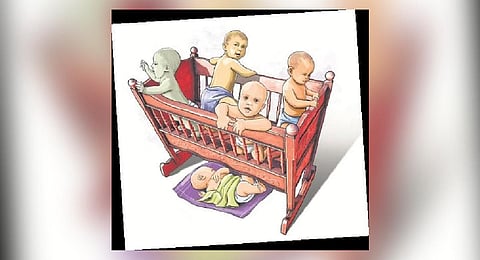

THIRUVANANTHAPURAM: The Rajiv Gandhi Centre for Biotechnology (RGCB) in Thiruvananthapuram has opened its doors to children with rare genetic diseases. Typically, parents seek treatment for their children by consulting a doctor who initiates the treatment based on the diagnosis.
However, in the case of rare diseases, even arriving at a diagnosis is challenging, necessitating the involvement of genetic experts to delve into the patient’s DNA to identify genetic variations or mutations associated with specific disorders.
At RGCB, experts analyse the candidate gene (composed of DNA), whole exome (specific gene regions), or conduct the more intricate whole genome sequencing, all free of cost. This initiative aims to provide hope for parents by identifying faulty genes and potentially initiating targeted therapies, despite the inherent complexity of the challenges they face.
RGCB is part of the nationwide Mission on Paediatric Rare Genetic Disorders, comprising 16 eminent centres, including All India Institute of Medical Sciences (AIIMS) and the Postgraduate Institute of Medical Education and Research (PGIMER).
“Complication starts with identification of the disease. People are not aware how to resolve such a condition. We are reaching out to clinicians, family support groups and public with this mission,” said Dr Moinak Banerjee, principal investigator at RGCB.
“Early and accurate diagnosis,” according to Dr Banerjee, “offers the advantage of starting targeted therapy for the child.” Knowing the specific gene involved can lead to measures to offer symptom relief or the consideration of special drugs, he adds.
To date, RGCB has conducted tests on 88 children, identifying conditions such as early infantile epileptic encephalopathy, trichothiodystrophy, and autism with multiple phenotypes. As many as 28 samples are intricate enough to warrant whole genome sequencing. “It is extremely important that these issues are understood, discussed and addressed by conducting awareness campaigns,” said Chandrabhas Narayana, director of RGCB.
Patients can be referred by doctors with their findings, or parents can directly approach RGCB. The mission focuses on children below the age of 12, requiring parents to provide results from routine blood investigations and brain imaging, or they can be guided by a telemedicine team based in Hyderabad.
Ministry of health and family welfare statistics indicate that 72 to 96 million people in India suffer from some form of rare genetic condition. While 7,000 rare conditions have are reported, only 4,000 have been documented in the ICMR’s National Registry for Rare Diseases. Notably, 80% of rare diseases are of genetic origin, with 70% manifesting in childhood.
Treatment is available for only about 300 of these diseases, and the associated costs can be exorbitant, with families spending significant amounts on drugs. Recently, a family had to spend `20 lakh for a single vial of medication for a child under treatment in a private hospital in Thiruvananthapuram. The mission also seeks to bolster family support groups, crucial in offering support to affected families as seen in developed countries.